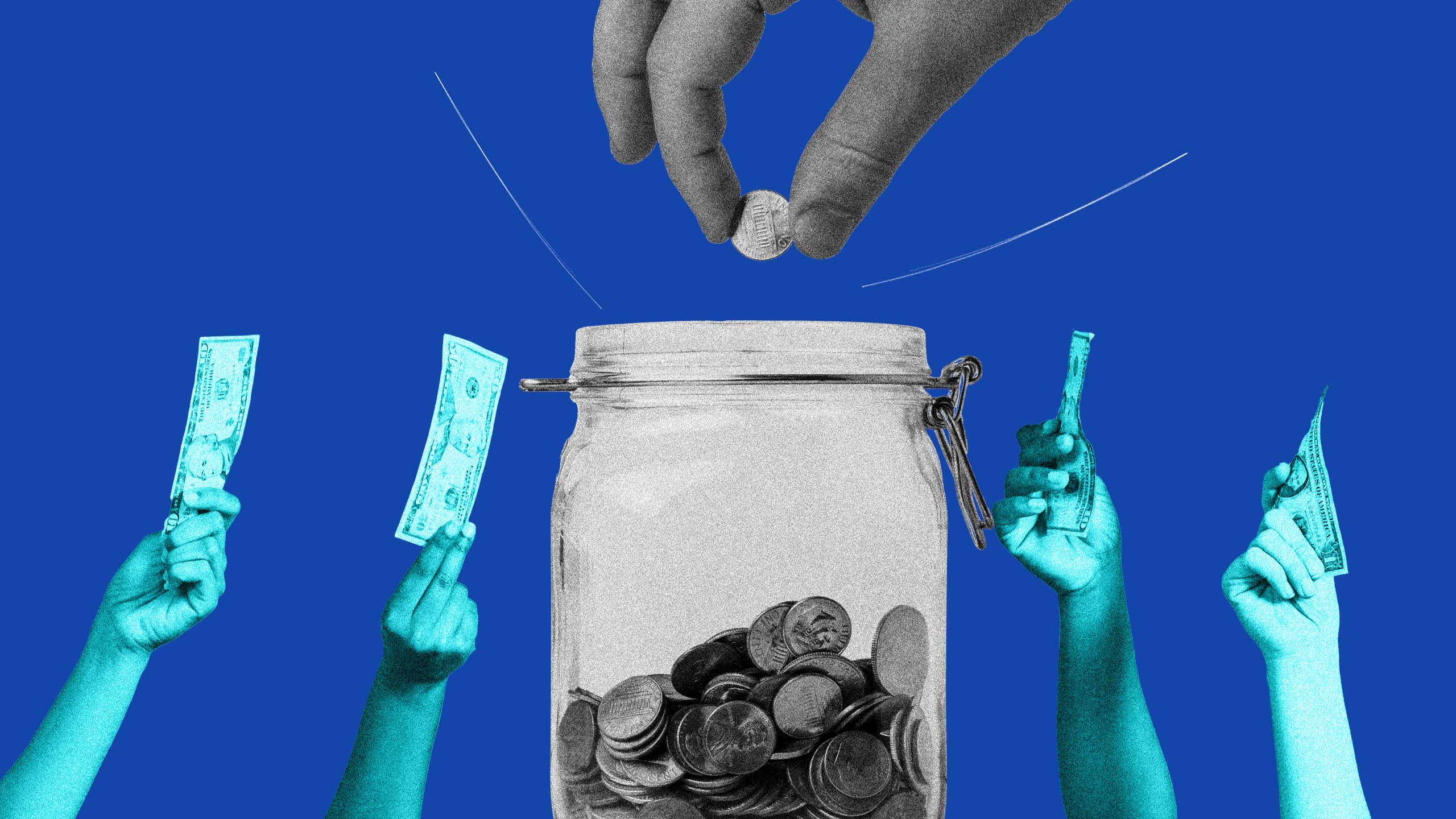After a year of record-high inflation, 23 states and D.C. increased their minimum wage on Jan. 1, raising the base pay for around 8.4 million workers nationwide, according to the Economic Policy Institute. By the end of 2023, 27 states in total will have ushered in minimum wage increases that range anywhere from $0.23 to $1.50 more per hour.
While the pay hikes promise to move the nation’s lowest earners closer to a decent living, tipped employees continue to face complicated workplace dynamics that determine their earnings. For queer tipped employees, the question of wages digs at even deeper and persistent issues.
The tip credit model, in which businesses use customer gratuity to pay part of their employees’ income, lies at the heart of the conversation around fairer pay. According to U.S. federal law, employers can choose to pay their tipped staff a “subminimum” wage. This wage can be as low as $2.13 an hour, as long as the tip amount compensates for the difference from their respective state’s regular minimum wage—or, for states without minimum wage laws, the difference from the $7.25 federal minimum wage.
This subsidy model “exploits employees’ overreliance on tips for income,” D.C.-based former server Tyler Sylvester tells Xtra.
During gaps between political campaign seasons, Sylvester worked as a tipped employee at a bar and a full-service movie theatre, mostly from 2021 to 2022.
“At the peak of the pandemic I saw how the tip credit system failed,” he recalls. “Tips dipped because we had fewer and sometimes homophobic customers. I cannot tell you one time I got the rest of my wage paid by my employer when tips fell short.”
According to a June 2022 study from One Fair Wage and the UC Berkeley Food Labor Research Center, which are both led by attorney Saru Jaryaraman, the tip credit model also forces LGBTQ2S+ restaurant workers to disproportionately tolerate sexual harassment from customers and supervisors—or risk slashed paycheques for speaking out.
The report found that queer and trans tipped workers are more susceptible to harassment than their non-LGBTQ2S+ counterparts. One Fair Wage communications director Alex Morash, the report’s lead researcher, stated that 78 percent of cis straight women of colour and 82 percent of LGBTQ2S+ respondents reported experiencing unwanted sexual comments.
He added that more rampant usage of transphobic and homophobic slurs occurred after employees enforced mask policies amid pandemic health concerns. Customers who refused compliance, Morash observes, also “often pulled the tip.”
Eighteen percent of restaurant workers identify as LGBTQ2S+ as of March 2022, more than double the percentage of U.S. adults who identify as LGBTQ2S+.
The tip credit model has recently come under scrutiny. Last November, voters in D.C., where tipped wage starts at $5.35 an hour, overwhelmingly passed Initiative 82, a ballot proposal that aims to gradually increase the tipped minimum wage to match the non-tipped wage floor by 2027. The initiative now awaits congressional approval before becoming law; on Jan. 17, a unanimous D.C. Council emergency legislation delayed its implementation from its initial date in March to May.
In Michigan, where the subminimum wage is currently $3.84, the Court of Appeals panel is expected to rule next month on whether to eliminate lower wages for tipped workers by 2024. And organizers in Arizona and Maryland are planning on increasing tipped wages via 2024 ballot measures.
Hennessey, a D.C.-based drag queen who helped mobilize the drag community for Initiative 82, shares with Xtra that while rising wage floors nationwide is a “strong” first step to address economic inequality, disadvantages still linger for drag artists, who rely on tips as a major income source. Even before Initiative 82, Hennessey says, her mustached, alternative look had “negatively affected” their booking fees, holding her drag persona to the whims of gay venue management. Bar owners were additionally “among the most vocal Initiative 82 opposers,” driving a tense wedge between queer-owned venues and tip-reliant workers like herself.
Since Initiative 82 was slated to appear on the 2022 ballot, D.C. venue owners joined the Restaurant Association of Metropolitan Washington and the National Restaurant Association in publicly speaking out against the measure. They conceded in interviews with American University’s radio station WAMU that a sudden pivot away from the tip credit would be “difficult.”
Some D.C. gay bar and club owners concurred with the opposition. Dave Perruzza, who owns lesbian sports bar A League of Her Own, said in The Washington Blade that ending tip credit could force him to lay off some of his workers, most of whom are queer. Perruzza told Metro Weekly in December: “If people want happy hour specials, they’re not going to get happy hour specials anymore.”
John Guggenmos, owner of gay bars Number Nine and Trade, told DCist that the initiative would hurt his businesses, and an automatic service charge of up to 20 percent could be triggered to offset higher labour costs. Other restaurants, like Bread Furst, have already hiked steep service charges this year, Washingtonian reported.
Hennessey, however, feels that higher wages outweighed souring relationships with employers. Acting in solidarity with hourly-paid workers, they believe that “the hiring struggle of drag artists is tied to the question of minimum wage,” pointing to the fact that many of her drag friends turn to hourly-paid tipped minimum wage jobs as secondary income to offset drag-related expenses.
When publicly supportive of the initiative, former and current tipped workers and activists in D.C. also faced backlash from their managers. Ryan O’Leary, the proposer of Initiative 82 and a queer former tipped server, recalled how anti-Initiative 82 food service owners and employees berated workers who criticized the tip credit model.
O’Leary was among the Initiative 82 advocates directly attacked in a since-deleted four-hour podcast episode of The District of Misfits. In the December 2022 episode, a copy of which O’Leary saved, former and current D.C. bartenders and beverage service owners accused O’Leary and other pro-Initiative 82 workers of sending child pornography to anti-Initiative 82 advocates.
“This groomer rhetoric is what gets gay folks like myself killed,” O’Leary says. “For pro-Initiative 82 staff, these are their managers talking. It’s not like anti-LGBTQ2S+ harassment will vanish because a new law will pass.”
Even in states where the subminimum wage is prohibited, workers say that the tips they receive on top of wages don’t compensate for the delicate balancing act between economic stability and homophobic norms they face.
California’s minimum wage rose to $15.50 on Jan. 1, affecting over three million people. But critics question whether the raise is enough to cover basic expenses and mental healthcare, especially for LGBTQ2S+ workers: a data aggregate from July 2021 to March 2022 demonstrated that queer individuals faced multiple stressors, including lower income and financial reliance on tips, which affected their performance and mental health.
Avery Demesa, the shift lead at a Southern California boba café, says that he finds himself “shuttering [his] flamboyant voice” when he senses hostility from a customer interaction—frustrated customers likely meant sacrificing tips that benefit the entire team and help offset basic living expenses.
“The better the store does, the better the tips and our mental and financial well-being,” Demesa says. “Fifteen dollars and fifty cents [an hour] is not a comfortable income [for Southern California]. It’s a mix of my extroversion and gay identity, but I switch to less ‘feminine’ behaviour if customer interactions feel hostile.
“Tips on-top supplements our workers,” he continues. “I’m personally involved in a music program that costs a lot of money. And I have to pay rent. I have to pay for water, gas, electricity and the internet. The California minimum wage alone is not sustainable for that. And the job can get draining when I’m maxing out my credit cards. There’s a lot of sacrifices like dropping my voice because I’m working my way back to better financial stability.”
Washington state boasts the second-highest minimum wage in the U.S., paying workers $15.74 an hour starting January 1, 2023, to offset inflation concerns. In the city of Tukwila, the minimum wage rose to nearly $19 this year by ballot initiative after winning the approval of a resounding 82 percent of voters.
Despite these wins, Seattle-based non-binary burlesque dancer Vida Catastrophe argues that queer performers are often left out of the conversation. Most local LGBTQ2S+ artists are just breaking into the industry and “rely on generous tips to pay for travel costs; makeup and hair purchases; and prop-making,” Catastrophe says. Many find second or third jobs, often low-paying tipped hourly work, to support their artistry. Catastrophe herself works a second job in security to sustain her burlesque profession, which costs her between $100 to $350 per gig and up to 10 hours of pre-show prep time.
Still, they remain confident that rising minimum wages and collective queer organizing will spark nationwide discussions about tipped workers’ struggles—despite persistent backlash from queer bar and restaurant and service industry owners. Recently, they danced at drag shows to support worker-owned café Burial Grounds, seeing their performance as “a commitment to working-class stability” that forms “solidarity between service workers and sex artists.”
Hennessey echoes Catastrophe’s sentiments, understanding their identities as queer artists as “inherently political.”
“I know I’ve jeopardized my bookings by supporting the end of tip credit,” Hennessey says. “But we are not artists for attention. We are here for each other, and to preserve the queer spaces where we feel safer and loved.”


 Why you can trust Xtra
Why you can trust Xtra


